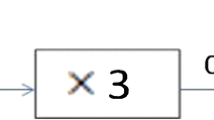Abstract
Our goal in this paper is to make two points. First, college students, even those who have taken a fair number of mathematics courses, do not have much of an understanding of the function concept; and second, an epistemological theory we have been developing points to an instructional treatment, using computers, that results in substantial improvements for many students. They seem to develop a process conception of function and are able to use it to do mathematics. After an introductory section we outline, in Section 2, our theoretical epistemology in general and indicate how it applies to the function concept in particular. In Sections 3, 4, and 5 we provide specific details on this study and describe the development of the function concept that appeared to take place in the students that we are considering. In Section 6 we interpret the results and draw some conclusions.
Similar content being viewed by others
References
AyresT., G.Davis, EdDubinsky, and P.Lewin: 1988, ‘Computer experiences in learning composition of functions’,Journal for Research in Mathematics Education 19(3), 246–259.
BaxterN., EdDubinsky and G.Levin: 1988,Learning Discrete Mathematics with ISETL, Springer-Verlag, New York.
BuckR. C.: 1970, ‘Functions’, in E. G.Begle (ed.),Mathematics Education — The Sixty-ninth Yearbook of the National Society for the Study of Education, The University of Chicago Press, Chicago, pp. 236–259.
DreyfusT. and T. A.Eisenberg: 1983, ‘The function concept in college students: Linearity, smoothness and periodicity’,Focus on Learning Problems in Mathematics 5(3,4), 119–132.
Dubinsky, Ed: 1989, ‘A learning theory approach to calculus’,Proceedings of the St. Olaf Conference on Computer Algebra Systems, Northfield, Minnesota.
DubinskyEd: 1991a, ‘Constructive aspects of reflective abstraction in advanced mathematical thinking’, in L. P.Steffe (ed.),Epistemological Foundations of Mathematical Experience, Springer-Verlag, New York.
Dubinsky, Ed: 1991b, ‘Reflective abstraction in advanced mathematical thinking’, in D. Tall (ed.),Advanced Mathematical Thinking.
Dubinsky, Ed, J. Hawks, and D. Nichols: 1989, ‘Development of the process conception of function in pre-service teachers in a discrete mathematics course’,Proceedings of the Thirteenth International Conference for the Psychology of Mathematics Education, Paris, France.
DubinskyEd, and P.Lewin: 1986, ‘Reflective abstraction and mathematics education: The genetic decomposition of induction and compactness’,The Journal of Mathematical Behavior 5, 55–92.
Even, R.: 1988, ‘Pre-service teacher's conceptions of the relationships between functions and equations’, in A. Borbas (ed.),Proceedings of the Twelfth International Conference for the Psychology of Mathematics Education, OOK, Veszprem, pp. 304–311.
Frendenthal, H.: 1982, ‘Variables and functions’,Proceedings of the Workshop on Functions, Organized by the Foundation for Curriculum Development, Enschede.
GoldenbergP.: 1988, ‘Mathematics, metaphors, and human factors: Mathematical, technical, and pedagogical challenges in the educational use of graphical representations of functions’,Journal of Mathematical Behavior 7, 135–173.
Herscovics, N.: 1982, ‘Problems related to the understanding of functions’, inProceedings of the Workshop on Functions, Organized by the Foundation for Curriculum Development, Enschede.
KaputJ.: 1987, ‘Representation systems and mathematics’, in C.Janvier (ed.),Problems of Representation in the Teaching and Learning of Mathematics, Louvrence Erlbaum, Hillsdale.
LeinhardtG., O.Zaslavsky, and M.Stein: 1990, ‘Functions, graphs and graphing: Tasks, learning and teaching’,Review of Educational Research 60(1), 1–64.
LovellK.: 1971, ‘Some aspects of the growth of the concept of a function’, inPiagetian Cognitive Development Research and Mathematical Education, NCTM, Reston, pp. 12–33.
MarkovitsZ., B.Eylon, and M.Bruckheimer: 1986, ‘Functions today and yesterday’,For the Learning of Mathematics 6(2), 18–24.
Orton, A.: 1970, ‘A cross-sectional study of the development of the mathematical concept of a function in secondary school children of average and above average ability’, unpublished Master's thesis, University of Leeds.
PiagetJ.: 1975, ‘Piaget's theory’, in P. B.Neubauer (ed.),The Process of Child Development, Jason Aronson, New York, pp. 164–212.
PiagetJ.: 1976 (Original published 1974),The Grasp of Consciousness (S. Wedgwood, trans.), Harvard University Press, Cambridge.
PiagetJ.: 1978 (Original published 1974),Success and Understanding (A. J. Pomerans, trans.), Harvard University Press, Cambridge.
PiagetJ., J.-B.Grize, A.Szeminska, and V.Bang: 1977,Epistemology and Psychology of Functions (J. Castellanos and V. Anderson, trans.), Reidel, Dordrecht.
SchoenfeldA. H., J. P.SmithIII, and A.Arcavi: 1990, ‘Learning — the microgenetic analysis of one student's understanding of a complex subject matter domain’, in R.Glaser (ed.),Advances in Instructional Psychology, 4, Erlbaum, Hillsdale.
SfardA.: 1987, ‘Two conceptions of mathematical notions: Operational and structural’, in J. C.Bergeron, N.Herscovics and C.Kieran (eds.),Proceedings of the Eleventh International Conference for the Psychology of Mathematics Education, III, Université, Montreal, pp. 162–169.
Skemp, R. R.: 1976, ‘Relational understanding and instrumental understanding’,Mathematics Teaching, December, 1976.
Thomas, H.: 1969, ‘An analysis of stages in the attainment of a concept of function’, unpublished Doctoral dissertation, Teachers College, Columbia University.
VinnerS. and DreyfusT.: 1989, ‘Images and definitions for the concept of function’,Journal for Research in Mathematics Education 20(4), 356–366.
von Glasersfeld, E.: 1985, ‘Learning as a constructive activity’,Proceedings of the Ninth International Conference of the Psychology of Mathematics Education.
VygotskyL.: 1978,Mind in Society: The Development of Higher Psychological Processes, Harvard University Press, Cambridge.
Author information
Authors and Affiliations
Rights and permissions
About this article
Cite this article
Breidenbach, D., Dubinsky, E., Hawks, J. et al. Development of the process conception of function. Educ Stud Math 23, 247–285 (1992). https://doi.org/10.1007/BF02309532
Issue Date:
DOI: https://doi.org/10.1007/BF02309532




